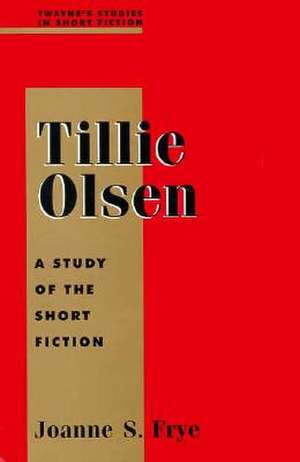Studies in Short Fiction Series: Tillie Olsen: Twayne's Studies in Short Fiction, cartea 0060
Autor Joanne Fryeen Limba Engleză Hardback – 31 iul 1995
Each volume offers:
-- A comprehensive overview of the artist's short fiction -- including detailed analyses of every significant story
-- Interviews, essays, memoirs and other biographical materials -- often previously unpublished
-- A representative selection of critical responses
-- A comprehensive primary bibliography, a selected bibliography of important criticism, a chronology of the artist's life and works and an index
Din seria Twayne's Studies in Short Fiction
-
 Preț: 350.47 lei
Preț: 350.47 lei -
 Preț: 436.17 lei
Preț: 436.17 lei -
 Preț: 435.60 lei
Preț: 435.60 lei -
 Preț: 351.99 lei
Preț: 351.99 lei -
 Preț: 351.77 lei
Preț: 351.77 lei -
 Preț: 350.08 lei
Preț: 350.08 lei -
 Preț: 353.52 lei
Preț: 353.52 lei -
 Preț: 350.85 lei
Preț: 350.85 lei -
 Preț: 353.90 lei
Preț: 353.90 lei -
 Preț: 351.00 lei
Preț: 351.00 lei -
 Preț: 288.71 lei
Preț: 288.71 lei -
 Preț: 352.76 lei
Preț: 352.76 lei -
 Preț: 478.53 lei
Preț: 478.53 lei -
 Preț: 459.07 lei
Preț: 459.07 lei - 23%
 Preț: 428.84 lei
Preț: 428.84 lei -
 Preț: 454.26 lei
Preț: 454.26 lei -
 Preț: 457.54 lei
Preț: 457.54 lei -
 Preț: 456.77 lei
Preț: 456.77 lei -
 Preț: 455.79 lei
Preț: 455.79 lei -
 Preț: 459.48 lei
Preț: 459.48 lei -
 Preț: 457.54 lei
Preț: 457.54 lei -
 Preț: 453.67 lei
Preț: 453.67 lei -
 Preț: 479.50 lei
Preț: 479.50 lei
Preț: 356.22 lei
Nou
Puncte Express: 534
Preț estimativ în valută:
68.16€ • 72.89$ • 56.83£
68.16€ • 72.89$ • 56.83£
Carte indisponibilă temporar
Doresc să fiu notificat când acest titlu va fi disponibil:
Se trimite...
Preluare comenzi: 021 569.72.76
Specificații
ISBN-13: 9780805708639
ISBN-10: 0805708634
Pagini: 232
Dimensiuni: 149 x 225 x 25 mm
Greutate: 0.48 kg
Ediția:New.
Editura: Twayne Publishers
Seria Twayne's Studies in Short Fiction
ISBN-10: 0805708634
Pagini: 232
Dimensiuni: 149 x 225 x 25 mm
Greutate: 0.48 kg
Ediția:New.
Editura: Twayne Publishers
Seria Twayne's Studies in Short Fiction
Textul de pe ultima copertă
In the four pieces gathered in her 1962 collection, Tell Me a Riddle - "I Stand Here Ironing", "Hey Sailor, What Ship?" "O Yes", and the title piece - and in the 1970 story "Requa I", Olsen addresses the problem of how to interpret the experiences - or as she would call them, "life comprehensions" - of those living outside the mainstream culture in a form - literature - whose very nature has been defined by that same culture. The result, writes Joanne Frye in this ambitious study of Olsen's short fiction, is a small body of work, with many layers densely packed, that conveys with lyricism and keen perception both the grace and the hardship inherent in people's daily lives. Frye's assessment also includes a comprehensive survey of the scholarship on Olsen as it grew from a scattered, mostly positive response to her artistry in the politically conservative 1950s and early 1960s to a feminist outpouring as the women's movement took hold in the late 1960s and the 1970s. More recent studies of Olsen's work complement the earlier criticism with more direct investigations of its biographical and political underpinnings.
